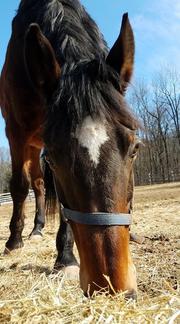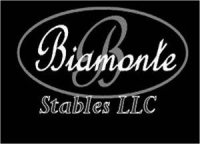
Barn Managers juggle managing horses and managing budgets. It’s our responsibility to provide the horses with everything they need, in the most cost efficient way possible. That applies to staffing and resources. Most people seem to forget that this horse business, is well, a business.
One of the things we managers have to think about is the cost of feed. Not only should we need to know a fair amount about feed stuffs, how a horse’s gastrointestinal system works as well as what their nutritional needs are. I am often amazed how little people in this position know about these topics, esp in the days of “google it”. My brain always wants to learn more…more, more, more! I read a lot. I talk to other equine professionals. I take classes. I contact companies and ask them about their products.
I have contacted the companies of every feed product we have in the barn to ask them for more detailed nutritional information about their products. Companies are very receptive! It may take them a few days to get back to you with the information you want, but the will!
Recently I contacted a company about their rice bran. I wanted to know how many calories are in a pound of their product. They got back to me within 48 hours. Their rice bran meal has 1400kcal/pound. Of course, I should have been more specific in my question, so have shot them another email. I need to know if that’s total calories or digestible energy (DE). There is a difference! We managers need to know about stuff like DE, the difference between a mcal and a kcal. Yes, I actually know how many calories are in all the feed we use. People often look at me like I have snakes coming out of my head when I can just spout off that type of info. Well, that’s part of my job. If you bring your horse to me and it needs to gain weight, I need that type of information to develop the correct feed plan that is specific to your horse. Oh, and we do a lot of math…so pay attention in school kids! We use a lot of math formulas to figure out what the heck to feed George, the big bay on the end.
But, it’s not just about calories. It actually does matter what is in the grain! What does it mean when the label says grain products vs soybean hulls? What about the calcium/phosphorus ratio? How about what is the story with the selenium content of your region’s soil? What is the Non Structural Carbohydrate (NSC) level of the feed? What the heck is the difference between NSC and the other kind? What do NSCs do in the horse’s hindgut? Let’s not even get started on hay!!!!
Every horse in our barn is on a different feed plan based on their needs. I check their weights regularly. I have a few horses in the barn whose owners almost never come to the barn. I don’t get to see these horses naked in the winter unless I go take off their blankets to evaluate their weights. I do that every Friday for those horses. The horses in regular work I see going by me, or standing in the grooming stalls naked on a regular basis. My eyes, and hands, immediately go to checking those horses’ weights. I want to see and feel their body condition. Most people don’t even notice that I am body conditioning their horse. They just think I am just petting and snuggling them! I then make adjustments accordingly. I like horses to have a body condition score of about 5-6. My boarders are funny. They have no idea what their horses are eating. I am happy to tell them if they are interested, but from experience they all trust me to manage their horse’s nutrition. You can always tell the new boarder. They are the ones helping me in that department.
In this instance I am weighing options for an older mare that has very few teeth left. She is in good body condition now, She has hay in front of her 24/7 but it gets harder every year for her to chew it. So we were trying to decide what to add. After looking at everything we said no thank you to the rice bran and decided to add a lunch of beet pulp. She loves it, and the cost per calorie is less. The bonus is it good for her and her hind git. In addition the beet pulp is a great alternative as you can replace something likev80% of a horses long stem forage requirements with it.
In this case I am looking for the best option for an older horse who does not have many teeth left. This horse is in good body weight now, but hay is difficult for her. Cost is an issue, there are not unlimited resources. She currently has hay available 24/7 and there is some quidding. Her grain now is extruded and high in fat, low in NSCs already. After looking at everything, we decided to not add rice bran but to go with the addition of a beet pulp lunch. She loves beet pulp. It's a good, cost effective feed source that is good for her and you can use it to replace up to something like 80% of the long stem forage requirements. It's also inexpensive, high in fiber and adds water to her GI tract. It's no big deal for me as I already feed beet pulp am and pm to all the horses anyway.
Now, I am no equine nutrition expert. There are Equine Nutritionists! Yes, it is an actual thing and they go to school a long time to become that expert! But the stuff I am mentioning here is just basic stuff that every person managing your horses feed should know. You should ask them. Whoever is managing your horses feed should know this stuff, even if it’s you.
I mentioned something about calories in the rice bran and that based on the math I wanted to increase their hay the other day to someone and was reminded that not everyone knows that kind of stuff. So I thought I would share a little bit here. I will share some links if you want to learn more.
Let’s do it a fun way, Q & A! See if you know the answers to these questions before following the links I have included after them!!!
- How many calories does a horse need per day to maintain their body weight? Hint…it’s a range depending on the variables.
- Which has more calories per pound, fresh grass in the pasture or hay?
- What is a good body condition score for a horse?
- What is considered a moderate vs a heavy workload for a horses
- Which has more calories
So now follow the links and see how you did on those questions...go ahead, I will wait...
So how did you do on those questions? Did you learn anything new from any of those links???
General Info on this stuff:
https://equinenutritionnerd.com/2014/02/20/calories/
http://www.myhorseuniversity.com/node/678
http://www.thehorse.com/articles/32961/types-of-carbohydrates-in-horse-feed-diets
http://www.understanding-horse-nutrition.com/horse-feeding.html
http://www.understanding-horse-nutrition.com/feed-tag-conversions.html
Video on Body Condition Score: https://www.youtube.com/watch?v=bq0ZXnSlsNQ
Body condition score diagram: http://www.thehorse.com/free-reports/30154/equine-body-condition-score-poster

 RSS Feed
RSS Feed

